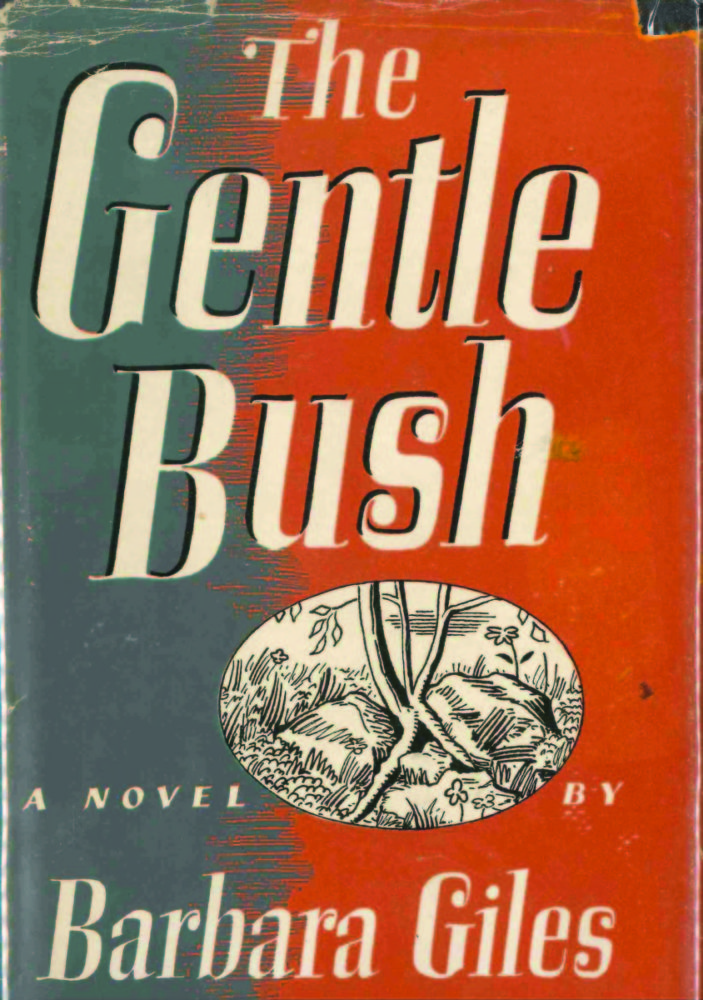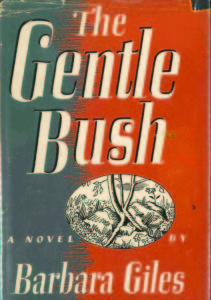Lost Lit
Moonlight, Magnolias, and Marxism on the Bayou Teche
Barbara Giles’ The Gentle Bush rewrites Gone With the Wind
Published: March 1, 2019
Last Updated: May 31, 2019

Harcourt, Brace, and Company
First edition cover of The Gentle Bush.
In 1947, while the nation was awash in the Scarlett-tinged schlock that proceeded from Margaret Mitchell’s bestselling, Pulitzer Prize–winning 1936 novel and its blockbuster 1939 cinematic adaptation, Barbara Giles published an alternative. The Gentle Bush begins much like any plantation romance: the “ancient, honorable, beautiful, and stylish” Durel family of Bienville, a fictional town on the Bayou Teche (not the village of the same name in north Louisiana), struggles to maintain its wealth and prestige during the lean years of Reconstruction. One branch of the family tree—“the swamp aristocracy,” people call them—has stooped to selling pecans to make do. Another branch gripes that “my land is diminishing.” Only the third, headed by Agricole, Jr., has maintained its sugarcane holdings since war’s end, ensuring the old adage that “in this region you had only to say ‘Durel’ and it was like saying ‘God.’”
Over 550 pages, the novel covers all the moonlight and magnolia bases. There are marriages, sumptuously attired parties, gallantly mustachioed men riding galloping horses, and gunplay. But a subtle and discordant echo resonates throughout the story. Giles’ only novel, The Gentle Bush might be Louisiana’s lone Marxist moonlight-and-magnolias novel. Taking its title from a line in a Carl Sandburg poem—“Let the gentle bush dig its root deep and spread upward to split one boulder”—Giles chronicles the class struggle between the ruling class (the Durels) and the proletariat (African Americans and Cajuns).
The Durels’ homes are full of broken clocks and mildewy smells. Their servants aren’t happy-go-lucky caricatures—they serve unhappily. And then there’s the novel’s protagonist, Agricole’s youngest son, eleven-year-old Michel, a bookish boy bored by his lot in life. He has no interest in firing his great-uncle’s Civil War pistol. He remains traumatized by the beatings he witnesses his father dole out to the plantation’s workers. And he develops a rapport with the local, impoverished Cajun population, particularly Peter Boudreaux, a boy of his own age who also strives to escape the confines of his social standing.
The novel’s core explores Michel’s two reluctant returns to Bienville after graduating from boarding school, then college. He becomes interested in law, progressive politics, and his family’s relationship to the land and its laborers. “I can understand sometimes how it is that men want so badly to possess land—land of their own,” he muses to his younger sister. “And still I can never get rid of the idea that it is ridiculous . . . to talk of ‘owning’ such things. How can you possess all that?” Rhett Butler this ain’t.
Like Michel, Barbara Giles grew up in the Bayou Teche’s cane country, where her father worked as a sugar refinery bookkeeper. After graduating from the Louisiana State University School of Journalism in 1925, she worked as a political reporter and literary critic in Washington, DC, then New York, where she wrote and edited for far-left magazines, including the New Masses and the Outlook. At some point, she joined the Communist Party USA, and she remained a member until 1966, long after the actions of Joseph Stalin and Joseph McCarthy eroded its ranks in the prior decade. Her husband, Edmund Weil, died five years later, after which Giles suffered a number of what were then deemed “breakdowns” before passing away in New York, on April 19, 1986, in literary obscurity.
More Puritan than full-bore Leninist, Michel clings to the soil he abhors after inheriting half of his father’s plantation. He quarrels with his elder brother over giving the cane workers a fifteen-cent raise and eventually rehabs their ramshackle, antebellum-era quarters on his own dime. “When people begin to talk of the land as their responsibility,” a friend warns Michel, “that is the beginning of the end.”
The book’s final section skips ahead to the 1910s, a time when Bienvillians murmur closed-door rumors of socialist Eugene V. Debs and Teddy Roosevelt’s Progressive Party. Peter Boudreaux, now a legal aid lawyer, joins up with the Bull Moosers. Michel, having sold his inheritance, now runs the town newspaper, where he pens editorials in support of his Cajun friend’s bid for a state legislative seat. All the while, Michel bitterly wishes that the political winds would shift in even more radical directions. “An earthquake made by men—that would be something else, would it not?” he asks a skeptical Peter. “If I could see how it might happen, not tomorrow but in ten years or twenty or even a century—if I could see only what might bring it about—that is all I would ask.”
Karl Marx, of course, would reassure Michel that the revolution would finally come with the “forcible overthrow of all existing social conditions,” as The Communist Manifesto plainly states. But there will be no proletariat uprising in the cane fields lining the Bayou Teche. Perhaps weary of a world wracked by war and ruin, Barbara Giles ends her novel on a decidedly pessimistic note, a double lynching culminating in the deaths of Peter and his client, a black man falsely accused of theft. Michel is distraught but takes comfort in the fact that the Durels will not rule Bienville for much longer: his family tree has produced no male heirs. “The family history,” Giles writes, “was coming to a swifter, more fitting end than he had anticipated.”
By book’s end, the roots of Giles’ gentle bush continue their deep dig into the boulder that is the Bayou Country’s innately racist and patriarchal foundation, roots that produce tiny fissures, that when combined, might one day split the rock.
Rien Fertel’s newest book is Southern Rock Opera.
